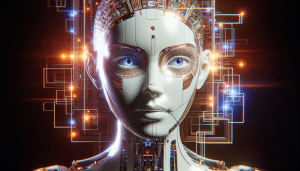Trends in AI-Powered Healthcare Solutions
Oliver Cooper August 21, 2025
Artificial intelligence (AI) has moved from being an experimental tool in healthcare to a core driver of transformation across the industry. Hospitals, insurers, startups, and pharmaceutical giants are adopting AI-powered healthcare solutions to improve diagnostics, reduce costs, and personalize patient care. In 2025, the integration of AI into healthcare is no longer optional—it’s an expectation.
From AI-assisted radiology to predictive analytics for chronic disease, the latest trends in AI-powered healthcare solutions show how technology is reshaping patient outcomes, clinical efficiency, and even medical research. This article highlights the most significant trends and why they matter for the future of medicine.

Why AI-Powered Healthcare Solutions Matter
Healthcare systems worldwide face rising challenges: aging populations, workforce shortages, and skyrocketing costs. According to the World Health Organization, there will be a global shortfall of 10 million healthcare workers by 2030. AI-powered healthcare solutions are stepping in to fill this gap, providing tools that automate repetitive tasks, enhance diagnostics, and improve access to care.
A 2024 McKinsey report estimated that AI could generate up to 150 billion dollars annually in healthcare cost savings by improving efficiency and reducing errors. As a result, governments, hospitals, and startups are investing heavily in AI adoption across healthcare systems.
Key Trends in AI-Powered Healthcare Solutions
1. AI-Enhanced Diagnostics
One of the most impactful applications of AI in healthcare is diagnostics. Machine learning models can process medical images, lab data, and patient histories with remarkable accuracy.
- Radiology: AI platforms are now capable of detecting conditions like lung cancer, strokes, and fractures faster than traditional methods. For example, Google Health’s AI tools demonstrated equal or greater accuracy than radiologists in mammogram screenings.
- Pathology: AI is also helping pathologists analyze biopsies, reducing turnaround times and improving precision in cancer detection.
- Wearable Data Integration: Devices like smartwatches and continuous glucose monitors feed real-time data into AI algorithms, flagging anomalies for early intervention.
This shift is making diagnostics more efficient while helping clinicians focus on patient care rather than manual data review.
2. Personalized Treatment Plans with Predictive Analytics
AI-powered predictive models are revolutionizing how treatment is delivered. By analyzing vast datasets, AI can identify patient-specific risk factors and recommend tailored therapies.
- Chronic Disease Management: Platforms like IBM Watson Health and Health Catalyst use AI to predict complications in diabetes, heart disease, or asthma before they escalate.
- Precision Medicine: Pharmaceutical companies are leveraging AI to analyze genetic and molecular data, enabling doctors to prescribe treatments aligned with an individual’s unique biology.
- Mental Health: AI-powered chatbots and apps are providing real-time mental health support, offering early intervention for patients before crises emerge.
Personalized care reduces unnecessary procedures, lowers costs, and leads to better long-term outcomes.
3. Generative AI in Drug Discovery
Drug discovery has traditionally been a time-consuming and expensive process, often taking over a decade and billions of dollars to bring a drug to market. Generative AI is shortening this cycle dramatically.
- Molecule Generation: Companies like Insilico Medicine and BenevolentAI use generative AI to identify new compounds in weeks instead of years.
- Clinical Trial Optimization: AI can analyze patient records to identify candidates for clinical trials, reducing recruitment time and improving trial diversity.
- Repurposing Existing Drugs: Algorithms are uncovering new uses for approved drugs, speeding up development and regulatory approval.
By reducing costs and timelines, AI is making life-saving drugs accessible faster.
4. Virtual Health Assistants and Patient Engagement
AI-powered virtual assistants are emerging as essential tools for patient engagement. These digital helpers provide 24/7 support, answering questions, scheduling appointments, and guiding patients through treatment protocols.
- Hospitals and Clinics: Many health systems now use AI chatbots to triage patient concerns before connecting them to doctors.
- Elderly Care: AI assistants integrated into smart home systems remind seniors to take medications or alert caregivers in emergencies.
- Language Accessibility: AI-powered translation tools are breaking down language barriers, ensuring patients receive clear information in their preferred language.
This trend improves healthcare accessibility and reduces the administrative burden on providers.
5. AI in Robotic Surgery
Robotic-assisted surgery has advanced significantly with the integration of AI. Systems can now analyze patient data, predict complications, and assist surgeons with enhanced precision.
- Pre-Surgical Planning: AI creates detailed surgical simulations, enabling doctors to prepare for complex procedures.
- Intraoperative Support: Robots like Intuitive Surgical’s da Vinci system are evolving with AI capabilities to minimize errors and shorten recovery times.
- Post-Surgical Monitoring: AI tools track patient recovery data to ensure successful rehabilitation.
While not replacing surgeons, AI-powered robotic systems are augmenting human skills for safer and more effective surgeries.
6. Administrative Automation and Workflow Efficiency
Beyond patient care, AI is transforming the administrative side of healthcare. Tasks like billing, insurance claims, and scheduling are increasingly automated.
- Claims Processing: Insurers are adopting AI to reduce fraud, speed up reimbursements, and cut operational costs.
- Resource Allocation: Hospitals use AI to forecast patient inflows and allocate staff accordingly, preventing burnout.
- Medical Documentation: Natural language processing (NLP) tools like Nuance Dragon Medical streamline clinical note-taking, giving doctors more time with patients.
This trend helps reduce the bureaucratic burden that often frustrates both providers and patients.
7. Ethical AI and Data Privacy in Healthcare
As AI adoption grows, so does concern about data privacy and algorithmic bias. Emerging practices emphasize responsible AI use:
- Bias Reduction: Developers are training models on diverse datasets to avoid inaccuracies that disproportionately impact certain populations.
- Regulatory Oversight: The EU’s AI Act and the U.S. FDA’s evolving guidelines are shaping how AI tools can be safely deployed in healthcare.
- Data Security: Companies are investing in encryption, anonymization, and blockchain to secure sensitive patient data.
Trust is essential for the success of AI-powered healthcare solutions, making ethics a cornerstone of innovation.
Challenges to Adoption
Despite rapid growth, AI-powered healthcare solutions face several barriers:
- Integration with Legacy Systems: Many hospitals still rely on outdated software that doesn’t support AI adoption.
- Cost of Implementation: While AI reduces costs long term, upfront investment can be prohibitive for smaller institutions.
- Training Healthcare Workers: Successful adoption requires training clinicians to understand and trust AI tools.
- Public Perception: Patients may be wary of “machines” influencing their treatment without clear explanations.
Addressing these challenges will determine how quickly AI becomes fully integrated into mainstream healthcare.
The Future of AI in Healthcare
Looking forward, AI-powered healthcare solutions will become increasingly interconnected. Imagine a patient journey where wearable devices detect early warning signs, AI algorithms generate instant diagnoses, and virtual assistants provide personalized health coaching—all while clinicians oversee and validate care.
As generative AI, robotics, and predictive analytics converge, healthcare will shift toward a proactive, personalized, and accessible model. The next decade promises not only better outcomes but also a reimagining of healthcare delivery on a global scale.
References
- Why AI Matters in Healthcare- https://www.wired.com
- AI-Enhanced Diagnostics- https://www.nature.com
- Generative AI in Drug Discovery- https://communities.springernature.com







